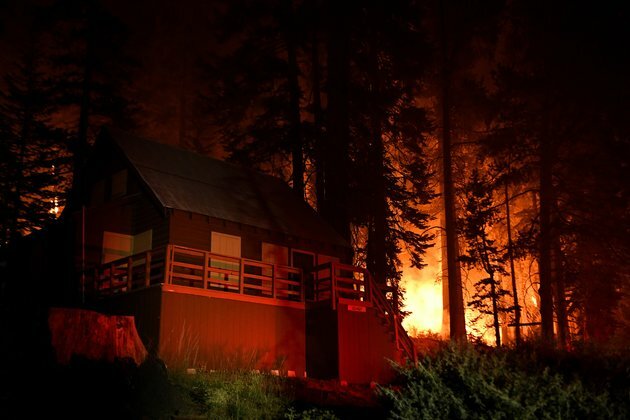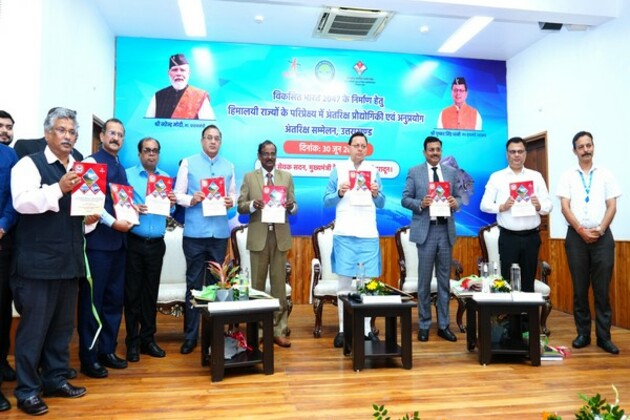A new ratings industry is emerging to help homebuyers assess climate risks
The Conversation
23 Nov 2021, 20:09 GMT+10

As climate change fuels large-scale natural disasters, wildfire evacuations in the West and flooding from the South to New York City and New England.
Buying a house is complicated enough in a market that has become supercharged in many U.S. cities. Emerging climate change risks will further complicate those decisions. Investors will be less likely to regret their decisions if they do due diligence in researching local climate risks. Mortgage lenders will face less risk of borrowers defaulting, and insurers will face fewer losses, if they factor climate risks into decisions on loans and insurance policies.
I study environmental economics, and in my recent book, "Adapting to Climate Change: Markets and the Management of an Uncertain Future", I explore how the rise of Big Data will help people, firms and local governments make better decisions in the face of climate risks. I see the emergence of a climate risk analysis industry for real estate as a promising development, but believe the federal government should set standards to ensure that it provides reliable, accurate information.
Prices send climate signals, but not everyone listens
Home prices reflect implicit judgments about whether properties are good investments - including the house and the area around it. For example, the current median home value in California is nearly US$720,000 - more than twice the national median. This difference reflects a judgment that California offers a desirable climate, lifestyle and job opportunities.
People who buy property in California are betting that the state will continue to be a great place to live in the future. If climate change devastates large portions of it, buyers could regret their investment.
Recent research studying U.S real estate shows that flood risk and fire risk are reflected in current housing prices. Properties that are perceived to be riskier sell for a lower price - but it's not clear whether these climate price discounts fully compensate buyers for the risks they are exposed to.
Concern about emerging climate risks varies, due partly to the partisan divide. It's fair to assume that some buyers will be eager to purchase homes in locations that others view as too risky. When people disagree about the probability of a bad outcome, the more optimistic bidder is more likely to purchase the asset.
Climate change is making extreme weather events, such as tropical storms and flooding, more frequent and intense in many places. Will people's risk perceptions shift along with these changes? Studies show that many people underestimate climate risks to housing.
As Nobel laureate economist George Akerlof has shown, asymmetric information in markets - when sellers know more about a product than buyers - can impede trade. Buyers rightly fear getting stuck with a "lemon," whether it's a used car or a house that floods with every big storm.
In the auto market, rating systems like Carfax help level the playing field; in the real estate industry, climate concerns are creating an opportunity for a nascent industry of climate risk screening modelers offering similar service for homebuyers.
Like Standard & Poor's but for climate risk
Just as Moody's and Standard & Poor's rate private companies' creditworthiness to help inform investor decisions, a growing set of firms seek to assess spatially refined climate risks, ranging from flooding to extreme heat and wildfire risk. These companies include Climate Check, First Street Foundation, Jupiter Intelligence, Moody's ESG Solutions Group and RMS.
Climate risk raters use recent natural disasters to compare the geography of recent flood events to what their model predicts. Typically, they combine peer-reviewed research in climatology and hydrology with a climate change model to generate risks maps. First Street Foundation has posted a step-by-step overview of its modeling approach.
[Like what you've read? Want more? Sign up for The Conversation's daily newsletter.]
Like any emerging industry, spatially refined climate prediction has grown unevenly. Some models are scientifically sound and highly precise, while others are lower quality. In a normal market, consumers would select the winning products through market competition - but for climate risk forecasts, it may take years to assess which offerings are most reliable.
I believe the federal government should play a role in screening the new generation of climate risk products. Regulators could work with the National Science Foundation to create a jury of experts to evaluate the new products.
One way to quality-check these offerings would be to foster a competition in which teams post forecasts about the likely locations of disasters in 2022, and then are ranked early in 2023 based on how well they predicted actual outcomes. This kind of annual review could nudge participants to upgrade their models regularly. One potential example is algorithmic trading competitions in financial markets, in which contestants develop new models to accurately predict how the stock market will respond to large trades.
Saving lives and protecting assets
Climate risk assessment firms could help make the U.S. real estate sector more resilient by helping homebuyers become more sophisticated and realistic property shoppers. Lending patterns will shift as banks offer borrowers less-generous terms for riskier properties. This incentive should nudge people to bid more for relatively safer properties and to seek to live in less risky areas.
Such shifts in turn could nudge changes in local land use and zoning laws to upzone - allow higher-value or denser uses - in relatively safer areas. Building more homes in less risky areas would make climate adaptation more affordable.
Climate change confronts people with fundamental uncertainty. I see developing the skills and infrastructure to better predict local climate risks as a useful strategy for adapting to climate risks. If forecasters can develop trusted predictive models, people will face less future regret about their real estate investments and less risk in their daily lives.
Author: Matthew E. Kahn - Provost Professor of Economics and Spatial Sciences, USC Dornsife College of Letters, Arts and Sciences 
 Share
Share
 Tweet
Tweet
 Share
Share
 Flip
Flip
 Email
Email
Watch latest videos
Subscribe and Follow
Get a daily dose of Broadcast Communications news through our daily email, its complimentary and keeps you fully up to date with world and business news as well.
News RELEASES
Publish news of your business, community or sports group, personnel appointments, major event and more by submitting a news release to Broadcast Communications.
More InformationBusiness
SectionTech stocks slide, industrials surge on Wall Street
NEW YORK, New York - Global stock indices closed with divergent performances on Tuesday, as investors weighed corporate earnings, central...
Canada-US trade talks resume after Carney rescinds tech tax
TORONTO, Canada: Canadian Prime Minister Mark Carney announced late on June 29 that trade negotiations with the U.S. have recommenced...
Lululemon accuses Costco of selling knockoff apparel
Vancouver, Canada: A high-stakes legal showdown is brewing in the world of athleisure. Lululemon, the Canadian brand known for its...
Shell rejects claim of early merger talks with BP
LONDON, U.K.: British oil giant Shell has denied reports that it is in talks to acquire rival oil company BP. The Wall Street Journal...
Wall Street extends rally, Standard and Poor's 500 hits new high
NEW YORK, New York - U.S. stock markets closed firmly in positive territory to start the week Monday, with the S&P 500 and Dow Jones...
Canadian tax on US tech giants dropped after Trump fury
WASHINGTON, D.C.: On Friday, President Donald Trump announced that he was halting trade discussions with Canada due to its decision...
Sectors - Broadcasting
SectionSBA participates in World News Media Conference 2025 in Poland
SHARJAH, 7th May, 2025 (WAM) -- The Sharjah Broadcasting Authority (SBA) recently took part in the 76th World News Media Congress,...
"Landmark day for India's efforts to encourage sporting talent": New National Sports Policy 2025 approval
New Delhi [India], July 1 (ANI): On the occasion of the approval of the new 'Khelo Bharat Niti 2025', Prime Minister Narendra Modi...
Indian Institute of Creative Technologies begins admissions for Animation, Visual Effects, Gaming, in August
Mumbai (Maharashtra) [India], July 1 (ANI): The Indian Institute of Creative Technologies (IICT) opens admissions for its first batch...
Cabinet approves Research and Development and Innovation scheme with corpus of Rs 1 lakh crore to boost strategic, sunrise domains
New Delhi [India], July 1 (ANI): In a significant step to bolster India's research and innovation ecosystem, the Union Cabinet on Tuesday...
Georgia Risks EU Sanctions; Ukraine Hits Roadblocks In NATO, EU Bids
Welcome to Wider Europe, RFE/RL's newsletter focusing on the key issues concerning the European Union, NATO, and other institutions...
Uttarakhand CM Dhami participates in Space Conference 2025 focused on role of Himalayan states
Dehradun (Uttarakhand) [India], June 30 (ANI): Uttarakhand Chief Minister Pushkar Singh Dhami on Monday participated in the Space Technology...













